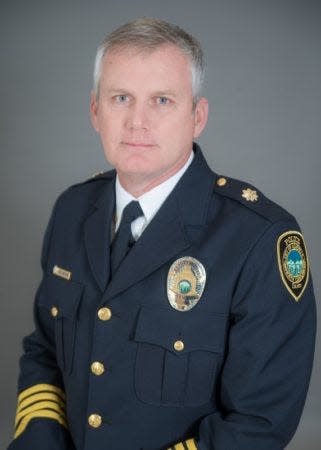Woman accusing APD deputy chief, 3 other cops, of aiding sex trafficking testifies
ALEXANDRIA, Va. - The woman known to jurors only as Jane Doe shook her head Jan. 12 when her lawyer asked her a question she knew was coming but clearly dreaded — could she describe the injuries she suffered during five years in a Virginia-based sex trafficking ring?
Her voice trembled as she described indignities suffered at the hands of clients of the prostitution ring. Eventually she broke down and sobbed uncontrollably — the words “I'm so ashamed” barely audible between the cries — forcing a temporary halt to the trial of Doe's civil lawsuit against a former police chief and three other officers.
It was the most dramatic moment thus far in a trial focused on blockbuster allegations that the former police chief in Fairfax County and the three officers were clients of the prostitution ring and that they served as its protectors by tipping off the head of the enterprise, Hazel Sanchez, when stings and undercover police would be in the area.
More:As sex trafficking trial naming APD deputy chief starts, why are Asheville leaders quiet?

Among those on trial are James Baumstark, the Asheville Police Department deputy chief who formerly served with the Alexandria department.
The former chief, Ed Roessler, and the other three officers all deny the allegations, though two former officers, Michael Barbazette and Jason Mardocco, admitted they were clients of Sanchez and resigned from the force after their phone numbers were found on Sanchez's phone.
So far, the jury has heard testimony from Doe and another woman who says she was trafficked. Both identified all four officers as men they had seen in the various hotels and apartments in northern Virginia where Sanchez would set up shop.
More:What alleged trafficking cover-up by top Asheville police official means to victims
They jury also heard from a decorated former officer, William Woolf, who was assigned to investigate sex trafficking as part of a multi-jurisdictional task force. Woolf testified that Barbazette, his supervisor, interfered in his investigations and that another senior officer, Baumstark, was indifferent when Woolf expressed concerns about how he was being managed.
While there is strong evidence that Doe and the women in Sanchez's operation suffered horribly, jurors in the civil trial in U.S. District Court in Alexandria face the much tougher question of whether the four officers abetted Doe's trafficking.
“They are with the force of the law. They're her to protect us. They have to not be clients,” Doe said Thursday, after she regained her composure and the trial resumed.
On cross-examination, though, defense lawyers raised doubts about whether the women accurately identified the four officers as clients.
More for subscribers:
Attorney: Sex-trafficking lawsuit alleging APD deputy chief's coverup is on a fast track
Virginia sex-trafficking lawsuit naming Asheville Police deputy chief locks in trial date
The allegations have evolved since the lawsuit was filed in 2021. The lawsuit initially did not identify any of the officers by name. Barbazette and Mardocco were added to the lawsuit after Doe's attorney, Victor Glasberg, learned that they had resigned after the FBI turned over the results of an investigation into Sanchez's prostitution ring, and that those findings prompted their resignations.
Roessler and Baumstark were added to the lawsuit initially on allegations that they were helping to cover up officers' misdeeds. It was not until the trial began on Tuesday that Roessler and Baumstark were publicly accused of being actual clients of Sanchez, who was convicted of running a prostitution ring in federal court and sentenced to prison.
Kim Baucom, the lawyer for Roessler and Baumstark, called the allegations against them “preposterous" and ”made up out of whole cloth."
More:Morale 'fragile' at Asheville Police Department; impacting retention, recruitment
Roessler retired as chief of Fairfax County, a populous suburb of the nation's capital, in January 2021 — years after the collapse of Sanchez’s ring and before Doe’s lawsuit was filed. There is no indication that the allegations played any role in his decision to retire.
Defense lawyers have cited evidence they say demonstrates that Doe was not a trafficking victim but a willing prostitute.
Doe has acknowledged that when she was recruited to come to the U.S. from Costa Rica in 2010 that she was willing to have sex for money.
But Doe said Sanchez's recruiter told her that she would primarily be doing nanny work and housekeeping in the U.S. Work as an escort would be a side gig, and she would go on dates with wealthy clients and could choose whether to have sex with any particular client, she said.
Both Doe and the other woman who testified were also questioned extensively on why they returned to work for Sanchez on multiple trips back and forth between Costa Rica and the U.S.
Both women testified that Sanchez threatened their families, showing them pictures of their children at home and at school, and implying that she had operatives in Costa Rica who could harm them. Both women also said they did not believe they could flee to police because they believed police were protecting Sanchez.
The trial is ongoing. Lawyers for the four officers have not yet presented their case.
This article originally appeared on Asheville Citizen Times: Woman accusing 4 cops of aiding sex trafficking testifies
